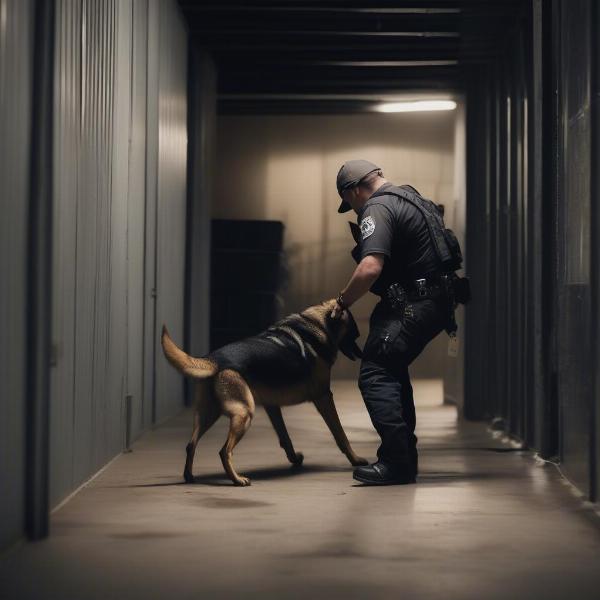Becoming a police dog handler is a rewarding but demanding career path that requires dedication, patience, and a genuine love for dogs. It’s not just about playing with puppies; it involves rigorous training, demanding situations, and a significant time commitment. This guide will walk you through the steps involved in becoming a police K9 handler.
Essential Skills and Qualities
Successful police dog handlers possess a unique blend of skills and personal qualities. Strong communication skills are crucial, not just for interacting with colleagues and the public, but also for understanding and guiding your canine partner. Physical fitness is essential, as the job often involves chasing suspects, navigating challenging terrain, and controlling a powerful dog. Patience and empathy are also key, as training a dog requires consistency and understanding of their behavior. Finally, a deep love and respect for dogs are paramount, as the bond between handler and K9 is the foundation of their effectiveness as a team.
Meeting the Requirements
The specific requirements for becoming a police dog handler can vary depending on the law enforcement agency and location. Generally, you’ll need to be a sworn police officer with a clean record and several years of experience. Some agencies may require specific qualifications or certifications related to animal handling or law enforcement. Research the agencies you’re interested in and familiarize yourself with their specific prerequisites. how do you become a police dog handler
The Training Process
Once selected, you and your assigned dog will undergo intensive training. This typically involves several weeks or months of specialized instruction covering areas like obedience, scent detection, apprehension, and control techniques. You’ll learn how to interpret your dog’s body language, issue commands effectively, and work together seamlessly in various scenarios. This training is both physically and mentally demanding, requiring dedication and commitment from both handler and dog. how do i become a police dog handler
Ongoing Duties and Responsibilities
Beyond initial training, the role of a police dog handler involves ongoing responsibilities. You’ll be responsible for your dog’s daily care, including feeding, grooming, and exercise. You’ll also need to maintain their training and proficiency through regular practice and continuing education. The bond between handler and K9 extends beyond work hours, as the dog often lives with the handler and becomes a part of their family.
 Police Dog Handler in Action
Police Dog Handler in Action
Is Becoming a Police Dog Handler Right for You?
Becoming a police dog handler is a challenging yet fulfilling career. It’s not simply a job; it’s a lifestyle that demands dedication, passion, and a deep understanding of canine behavior. If you’re passionate about law enforcement and have a genuine love for dogs, this might be the perfect career path for you. how to become a dog handler for the police
Conclusion
The path to becoming a police dog handler is demanding but rewarding. It requires a combination of law enforcement experience, specialized training, and a deep connection with your canine partner. If you’re willing to put in the work and dedication, this career can offer a unique and fulfilling experience. Remember to research specific requirements and prepare yourself for the challenges and rewards of working alongside a dedicated K9.
FAQ
- How long does it take to become a police dog handler? Becoming a police dog handler requires several years of experience as a police officer, followed by several weeks or months of specialized K9 training.
- What breeds are commonly used as police dogs? German Shepherds, Belgian Malinois, and Dutch Shepherds are common choices due to their intelligence, trainability, and physical capabilities.
- Do police dogs live with their handlers? Yes, in most cases, the K9 partner lives with the handler and becomes a part of their family.
- What kind of training do police dogs receive? Police dogs undergo extensive training in obedience, scent detection, apprehension, and other specialized skills.
- Is being a police dog handler dangerous? Like any law enforcement role, being a police dog handler can be dangerous, requiring physical and mental preparedness for various situations. music dog toy
- What are the physical requirements for becoming a handler? Handlers must be physically fit and able to handle the demands of the job, including running, navigating obstacles, and controlling a powerful dog.
- How can I learn more about becoming a police dog handler in my area? Contact your local law enforcement agencies or police departments to inquire about their specific K9 programs and requirements. dog attack sleeve
ILM Dog is a leading international website dedicated to providing expert advice and resources on all aspects of dog care and breeding. We offer comprehensive information on dog breeds, health, training, nutrition, grooming, and much more. Whether you’re a seasoned dog owner or just starting your journey, ILM Dog is here to support you every step of the way. Contact us at [email protected] or +44 20-3965-8624 for personalized guidance and support.